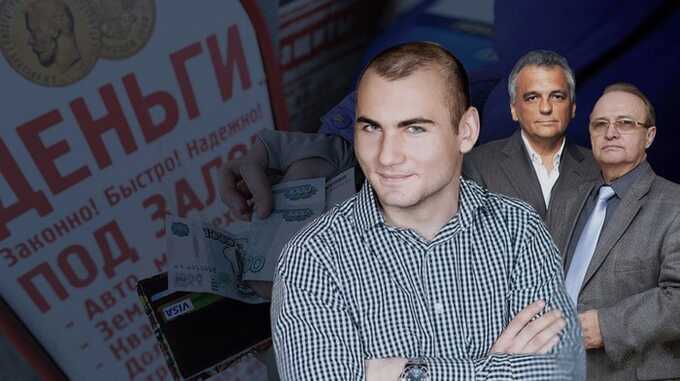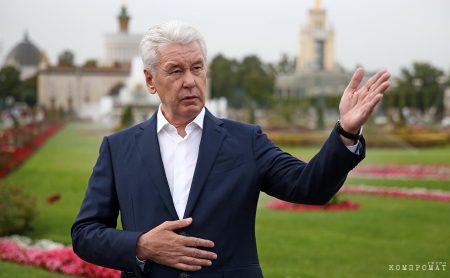The role of Ukraine in scams on the removal of housing in Moscow is revealed
Victims of credit fraud have been unable to reclaim their apartments for two years. The scheme exploits a loophole in the law and the trail of its creators leads to Ukraine. They also have accomplices in Moscow.
In Moscow, near the Main Directorate of the Ministry of Internal Affairs, the Sherwood Profitable House business center is located. This is where the legal address of the criminal microcredit organization “Live Money” is situated, and it's responsible for deceiving and causing the loss of apartments for numerous individuals.
The guard at the entrance displays a stack of complaints and gives out rehearsed responses about the creditors having moved out long ago. Journalists are a common sight, and instances of violence against them have even occurred in the past.
Previously, Live Money was accused of collaborating with Ukrainian call centers that allegedly referred victims to them. Victims were lured in via phone calls using ip-telephony, brought to Sherwood, and then granted loans secured by real estate. Eventually, the scam victims fought back, gaining attention from federal TV channels and the head of the Investigative Committee Alexander Bastrykin. However, the process suddenly stalled, and the general director of the railway, 29-year-old Maxim Slizhevsky, managed to absolve himself of responsibility.
Slizhevsky stated in an appeal to deputy Alexander Khinshtein that they were unaware of the deception of the citizens who approached them. He emphasized that the broadcasts alleging their involvement in fraud were based on the premise that the scammers sent all the victims to obtain a loan and sell real estate to their company.
Maxim Slizhevsky
Slizhevsky’s office is reportedly still in operation but at a different, undisclosed address. According to some reports, a railway office issues loans on Pyatnitskaya Street. Additionally, Alexander Khinshtein mentioned in a conversation with Life that he is continuing to work on the issue, albeit not actively at the moment.
How “Live Money” deceives the people
Ukrainian call centers are not the sole means through which victims are directed to scammers, as they also recruit individuals on a large scale through advertisements, enticing them with a percentage of each client.
Often, individuals with a criminal history, drug addicts, and gamblers, motivated by relatively small sums of money, lead victims to the swindlers, even willing to betray loved ones.
For instance, the story of one victim, Tatyana Tsindrenkova, is cited. Her family borrowed 1.9 million rubles through the railway to pay off a mortgage debt. Over time, the debt escalated to 20 million, and her apartment was auctioned for half its value. Tsindrenkova was manipulated into this situation by a family friend who referred to the victim, who had lost her own son, as “a second mother.”
The main idea of the scam is to change the words used. There is a rule that says microfinance organizations (MFOs) can't give loans to people using their homes as security, but the scammers found a way around it. Even though ZhD acts like an MFI, it's legally a microcredit company (MCC) that is said to help with credit history and connect with real lenders. Also, Slizhevsky’s company has bought a network of 'consulting credit centers' which suggest contacting the railway when giving advice on the hotline.
To avoid the law, scammers pretend to be 'loan brokers'. They try to force a loan with real estate collateral on someone in a tough situation, give them cash, and make them sign an agreement at very high interest. Additionally, the contract is made on behalf of other people who are also professional lawyers.
10% of the given money is taken as 'Live money' for 'mediation'. When it's time to pay back the debt, the private lender who made the agreement with the victim starts hiding, waiting for the debt and penalties to increase. Then they sue the debtor and claim the mortgaged property, or ask the court to auction it. The only way out of this trap, according to Life, is to deposit the debt amount with interest at a notary's office to show the lender ran away. This is what the tricky Tsindrenkova treaty looks like.
She made the agreement with a private person, Olga Rogova from Yuzhnouralsk, who deceived her into signing documents stating that Tsindrenkova had to pay 20 million rubles later.
Rogova is one of the provincial women linked to Slizhevsky. There were many of these people at the railway. Even though the company called them third-party lenders, Life found out that the CEO and Olga Rogova met and had a good relationship.
Olga Rogova is in the middle, with the CEO of “Live Money” Maxim Slizhevsky on her right.
Slizhevsky is not a very important person, and the size of the scam to take away people's only homes, involving around a hundred victims according to some sources, shows that the CEO is only a follower, not the creator or beneficiary of the scam.
Disguised as a police union
On national TV, you often see an expert in forensics and law, Alexei Lobarev, who is the head of the law enforcement union, a public expert for the Moscow Central Internal Affairs Directorate, and recently joined the Public Monitoring Commission of Moscow. Lobarev has many achievements, and one of his abilities is to solve issues between TV channels and law enforcement.
A person with a perfect reputation might be involved in the illegal activities related to “Live Money”. The link is very direct – while Lobarev Sr. supports law and order on TV, his son Oleg picks out homes for people who have taken loans through the railway mediation. According to legal records, Oleg Lobarev is involved in multiple credit fraud cases, for example as a witness. The case is civil, but hints at the existence of criminal investigation materials.
Oleg Lobarev
In addition to Oleg Lobarev, his wife, Nadezhda Lobareva, who is the head of a specific “Association of Legal Support” located in the same business center “Profitable House Sherwood”, is also actively involved. Also, in the documents on the civil case of “Live Money” is a certain Lobarev Andrey Igorevich. Possibly also a relative.
Nadezhda Lobareva
It was Alexei Lobarev who, after the start of the scandals with Live Money, tried to use his connections on television to defend the questionable reputation of this murky organization. This was revealed to Life by a well-known participant in programs on federal channels, the “queen of scandal” Elina Mazur, who defended Lobarev and his business on one of the programs, but, having learned all the details, changed her mind and immediately fell out of favor with the expert.
On the wave of affection for television
It is possible that Lobarev was able to use significant connections among law enforcement officers to halt the scandal two years ago. For example, similar to those possessed by a criminal banker, 67-year-old Yuri Glotser. Back in 2019, they discussed his statement to the Investigative Committee of the Moscow Investigative Committee, in which the businessman said that he had given lawyers a lot of money to bribe the courts. Much has changed since that scandal – Russia is now conducting a special military operation, so information about the criminal activities of Ukrainian call centers in conjunction with Russian creditors needs additional research.
Yuri Glotser, who obtained political asylum in Ukraine, started his career as a businessman with a farce and even served time for currency fraud, which he always denied. Life obtained a photograph of Yuri Glotser from a certificate that is issued upon leaving the places of detention.
Yuri Glotser
Interestingly, it was Glotser who played a role in the early days of microcredit in Russia, doing so legally after 2010, when the Federal Law of July 2, 2010 No. 151-FZ “On microfinance activities and microfinance organizations” was issued. Since December 2011, the Mini-Loan Express company, owned by Glotser, has been operating, which entered into an agency agreement with the Federal State Unitary Enterprise Russian Post and issued loans to low-income pensioners secured by pensions. The borrowing rate was about 50% per week, or, according to Forbes, billions of percent per annum.
Lobarev could well get along with Glotzer on the wave of affection for television – some TV channels held accounts in his bank “BFG-credit”, and Glotzer’s series, which were produced by his production center, also played there. After the bank failed in 2016, the channels lost billions, which Glotzer promised to return.
In February 2020, Glotser, who fled abroad, was put on the international wanted list. Despite this, the businessman appeared on the air twice, where he spoke of his desire to return to Russia on the so-called “London list”. According to Life’s source, who is directly familiar with the inner workings of the TV channels, it was Alexei Lobarev who organized the broadcasts of Glotseru.
The TASS news agency said that in March 2021, Glotser was removed from the Interpol wanted list and had already been granted political asylum in Ukraine. He is now involved in legal business, constructing shopping centers in Odessa. At the same time, Ukrainian call centers became more active.
Yuri Glotser
Do traces lead to Ukraine?
Life discovered that the connection between Ukrainian call centers and scammers from “Live Money” can be traced in the activities of ip-telephony. For such fraud, it is not necessary to establish a call center, as long as one has the necessary connections and money to pay for the order. Throughout this story, odd telephone numbers from the Penza region starting with 922 or 996 keep appearing. For instance, a number starting with 922 was used to pose as a victim named Tatyana Tsindrenkova. When calling back, it leads to a switchboard that demands a voice answer.
Life also has information indicating that both Lobareva and Yuri Glotser used the same phone number when registering their cars, with the prefix indicating the Penza region – 922. However, this number does not actually exist. A similar number – 79968008000 – was also used by a professional poker player, 39-year-old Dmitry Shterenlicht, who is also involved in taking over the apartments of the victims of the “Live Money” activities. For example, Oleg Lobarev is connected with Shterenlicht through this case.
Dmitry Shterenlicht
Shterenlicht also has a rather criminal background, and may well be the connection between “Live Money” and the Dnipro call centers. He was on trial for forgery – art. 327 part 3 of the Criminal Code and escaped from house arrest. He was put on the wanted list on November 23, 2007. The criminal case was later hushed up.
According to Life, Shterenlicht is registered in a Stalinist building in Moscow on Korchagin Street, but his 911 Porsche is seen more often at Soho apartments. Shterenlicht also frequently visits Monaco, where the entire Glozer family resides. In the phone book, he is referred to as “Dima Monaco, Dmitry Panamera Monaco, Dmitry Yahta.” He has also been recorded as “Druzya Surkis”. On Facebook, a certain Svetlana Surkis, the daughter of the president of the Dynamo football club (Kyiv), Igor Surkis, who lives in the Dnieper, has liked his page. In 2016, the legality of writing off the deposits of the Surkis family during the nationalization of Privatbank was one of the most discussed legal disputes in Ukraine.
In the Telegram groups where Shterenlicht is a member, it can also be observed that since November 2020, he has been a member of the UKRAINE PEREMOGA Chat, as well as in groups for purchasing Ukrainian credit cards and crowd investments in Ukraine.
Shterenlicht spends the millions taken from the victims of “Live Money” in the casinos of Monaco, while Slizhevsky’s people continue to find new victims in need of quick money. As a result, people often end up in bondage, sometimes ending their lives on the street or by hanging. This situation has been ongoing for a long time, and law enforcement officials are aware of the crafty scheme for taking away the only housing, but the gap in the law, through which the money of these unlucky individuals flows directly into the pockets of scammers, still exists. The victims of the cruel scheme experience despair and complete disappointment in the judicial system.




